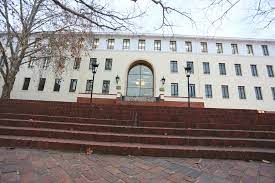How the Philosophy of Mathematics Inflences its Class-room Pedagogy
 |
| Rhodes Univesity General Library Photo from Google |
Mathematics is considered a critical subject in school learning, a window to career opportunities. It's important for mental discipline, building logical thinking, and helps knowledge construction in other subjects, including science and art. These are some of the embellishments of the subject.
However, a sad fact about the subject is that its success rate at the school and university level is unsatisfactory in many nations.
For example, in the latest result of an international exam given to teenagers, the US ranks 39 out of 79 nations. This is a reflection of what has been the case in the past two decades. US high school teaches maths differently than other countries, experts suggest. The criticism is pointing against the teaching methods.
Experts in India are also critical of the teaching methods practices in Indian classrooms. "Mathematics is not taught in India as a subject itself--it is taught to be a tool for engineering and eventual engineering career." For learners to become employable adults in a knowledge-based economy, the objective of learning mathematics has to change from merely learning computation or solving template-based problems to problem-solving, communicate and justify their solutions.
When I started teaching Maths in South Africa, one thing that struck me was the learner's poor achievements due to poor problem-solving skills and concept formation. A special mention needs to be made here about my learners there. Where I taught was not proper South Africa, a homeland of South Africa. The White minority then ruled South Africa had practised Apartheid---separate and hide the Black population away from them. It was White racism. (Like the caste practice of the so-called upper castes to separate and hide lower caste people away from them in India.)
The areas where the Black population was allowed to live was called Black Homelands. I was teaching in a Black homeland --Ciskei. However, I lived in proper South Africa, a White area, was commuting daily from my home to the school. The Black people who lived on a pastoral and agronomy economics were dispossessed of their land to stay in the homelands. They were generally poor, having poor morale, poor homes, poor material possessions. Parents had little income and were not educated. All those were ideal situation for their children less inclined to maths learning and getting poor results.
Something that had also struck me was the question; is everything right in the way mathematics is taught in the classrooms. To mention here something about the global standard of maths learning and curriculum is important here. So many countries in Africa were European colonies like India--South Africa, as I mentioned, was still under the rule of White colonists. All these post-colonies have taken a lot from the Western education systems-- especially in English, Maths and Sciences. In the western education system, learning maths is learning objective knowledge--the product knowledge and not the process knowledge or justification of the knowledge constructed, not its construction process. However, I never knew very little about these when I confronted my learner's poor classroom performance in the initial days.
I then decided to search for an academic solution to my classroom problem--to research it. Moreover, I lived within a kilometre radius of the Rhodes University campus, Grahamstown. Therefore, it was convenient for me to do the research as part of a Masters degree in Mathematics education. It was a two-year part-time degree course--I attend seven or eight weekly sessions in the first year as part of the course attendance, and then I was on my own. Then, in the second year, do the research, come with the outcome, write the research thesis and submit it to the university to wait for the academic body's approval—all under the keen scrutiny of my research supervisor, Terry Marsh.
Before that, I earned all necessary approvals from the Ciskeii Department of Education to do the course while under its service as a teacher and do the classroom research.
One section in the subject the learners struggled hard in the classroom was Euclidean geometry. I remembered that I myself had great difficulty grasping the logic of its learning methods in my school days. So, I was preparing to research the teaching methods in that.
However, after doing my research readings, I made a leap in my research proposal. The reason, in the meantime, I got a new angle to the question at hand--is there something wrong in the way mathematics is taught in the classrooms? In other words, what is the philosophy of Mathematics? The philosophy of mathematics explains its nature as knowledge.
By then, I realised that mathematics is taken to the classroom as an objective knowledge--not the logic of its construction. Leaners have to swallow it through route learning.
I can't pass on without mentioning the academic atmosphere at the university and its library. And the discovery I made while searching the learning materials on the isles between the lines of imposing shelves arranged with the books and the periodicals. The captivating book aroma intoxicated the voracious reader in me and the researcher. I found not only books in education, but in general philosophy, psychology, religions, also from Indian authors like S. Radhakrishnan.
Next, my research discovery.
This post No. 5 is part of the BlogChatter Half Marathon
Post No. 4 Learning Theories in Brief


Comments
Post a Comment